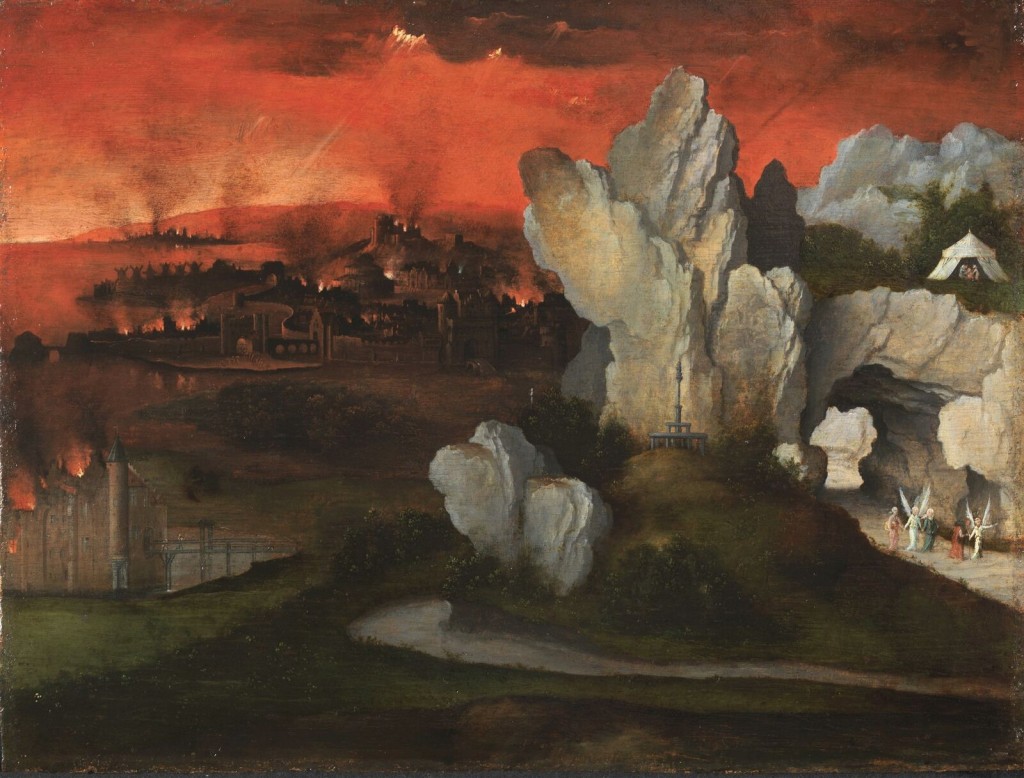 Painting By Joachim Patinir, Landscape with The Destruction of Sodom and Gomorrah
Painting By Joachim Patinir, Landscape with The Destruction of Sodom and Gomorrah
I will not pretend to know what Bob Dylan’s exact meaning with this song is but I will offer my thoughts on what I consider the second best song on Tempest.
Scarlet Town from the Bob Dylan album Tempest (with film footage from Masked & Anonymous):
The song feels like a mash of several songs, and that’s actually what it is. He draws inspiration from the old ballad Barbara Allen, but he just uses it as a framework to tell an even more sinister tale. The new parts of the song also feels like a split between two different songs, one set in biblical times and the other addressing the state of USA/The Western world today.
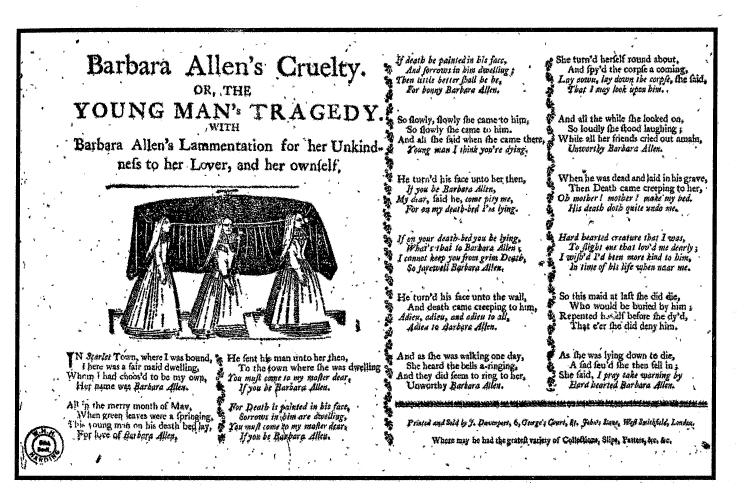
Lyrics Barbara Allen (The three first verses):
In younder town where I was born
There was a fair maid dwell’n
Made every youth cry well away
Her name was Bar-bry Ellen
Was in th merry month of May
When greenbuds they were swell’n
Sweet William come from th western state
An’ courted Bar-bry Ellen
Was all in the month o’ June
When everything was blooming
Sweet William on his death bed lay
For th love of Bar-bry Ellen
Bob Dylan has a long lasting relationship with Barbara Allen (the song) and I’ve included some versions here just as a reference.
Here is a wonderful separate post concerning Barbara Allen from Egil.
The first two verses from the Gaslight tapes (it’s eight minutes and has a lot of verses):
In Charlotte town, not far from here,
There was a fair maid dwellin.’
Had a name was known both far and near,
An’ her name was Barb’ry Allen.
‘Twas in the merry month of May,
Green buds they were swellin’,
Poor William on his death-bed lay,
For the love of Barb’ry Allen.
1988 live:
The first two verses in the -88 version:
In Scarlet Town where I was born
there was a fair maid dwelling,
and her name was known both far and near,
and they called her Barbara Allen.
T’was in the merry month of may
the green buds they were swelling,
sweet William on his death bed lay
for the love of Barbara Allen.
Two other artist that has used this song as a basis for an entirely new song are Gillian Welch and David Rawlings:
Not at all like the original Barbara Allen and the only two things it has in common with Bob Dylan’s song are, the title and it’s origin. The melody is different and the “story”/text is completely different (even if both have a distictly sombre tone). Gillian Welch/David Rawlings have more folksy/appalachian feel, while Dylan sings in a more talking blues style.
So what is the new Bob Dylan song Scarlet Town about?
I’ll do it verse by verse, it’s a complicated mission and I know a lot of people will disaggree with my (not so serious) analysis. And there are probably dozens of references and meanings that I haven’t discovered (yet…). Please do not take this too seriously, this is just a playful game, a way of looking at words that probably means something else entirely.
1. Verse (The setup part1)
In Scarlet Town where I was born (1)
There’s ivy leaf and silverthorn (2)
The streets have names that you can’t pronounce (3)
Gold is down to a quarter an ounce (4)
The music starts and the people sway
Everybody says, “Are you going my way?”
Uncle Tom’s still working for Uncle Bill (5)
Scarlet Town is under the hill (6)
1.) This is taken from the old song Scarlet Town/Barbara Allen
2.) Poison Ivy with it’s thorns, it’s a poisonous place.
3.) “where the streets have no name” = A mythological place
4.) Does it mean that money has little value in Scarlet Town? Or that the financial system has suffered a blow, I think it is a reference to the present financial situation in the world
5.) Referencing Uncle Tom’s Cabin, Uncle Bill = Uncle Sam? dollarBill? I’m not sure, and I did read a very dark interpretation somewhere: That Uncle Tom is Obama that is a puppet for Bill Clinton. That’s very cynical and I don’t think that’s the meaning.
6.) Boot Hill? A graveyard, a “dead” town. Purgatory is also described as located on/near a mountain in Dante’s The Divine Comedy, or does it simply mean that the town is well past its best days. There are also at least two biblical references, Matthew 5:14: “You are the light of the world. A city that is set on a hill cannot be hidden” and the story of Sodom and Gomorrah (depicted as located by some hills/under a hill).
Wikipedia:
The phrase entered the American lexicon early in its history, in the Puritan John Winthrop’s 1630 sermon “A Model of Christian Charity”. Still aboard the ship Arbella, Winthrop admonished the future Massachusetts Bay colonists that their new community would be a “city upon a hill”, watched by the world—which became the ideal the New England colonists placed upon their hilly capital city, Boston. Winthrop’s sermon gave rise to the widespread belief in American folklore that the United States of America is God’s country because metaphorically it is a Shining City upon a Hill, an early example of American exceptionalism.
Ronald Reagan: Used the term City upon a hill in his speeches when talking about USA
John F. Kennedy did the same when speaking about USA:
“Today the eyes of all people are truly upon us—and our governments, in every branch, at every level, national, state and local, must be as a city upon a hill — constructed and inhabited by men aware of their great trust and their great responsibilities”,
Both politicians referencing J. Winthrop
There is a possibillity that Bob Dylan has drawn an allegory between Sodom/Gomorrah and his homeland USA (“where I was born”), the “town” is in fact a country.
2. Verse (The Setup part2)
Scarlet Town in the month of May
Sweet William on his deathbed lay (7)
Mistress Mary by the side of the bed (8)
Kissing his face, heaping prayers on his head
So brave, so true, so gentle is he
I’ll weep for him as he’d weep for me
Little Boy Blue, come blow your horn (9)
In Scarlet Town where I was born (10)
7.) This is a character from the original song Barbara Allen, but it could also be a reference to Shakespeare (the author of the play, Tempest).
8.) This is maybe another biblical reference, the virgin or the prostitute, probably the prostitute.
9.) Taken from Little Boy Blue a popular old nursery rhyme.
10.) Again from Barbara Allen, meaning his home country USA, if we chose to see it that way.
3. Verse (The Bible says so)
Scarlet Town in the hot noon hours (11)
There’s palm leaf shadows and scattered flowers (12)
Beggars crouching at the gate (13)
Help comes, but it comes too late
On marble slabs and in fields of stone (14)
You make your humble wishes known (15)
I touched the garment, but the hem was torn (16)
In Scarlet Town where I was born (17)
11.) I think he’s telling us that the clock is ticking and it might be too late.
12.) I think Dylan is underlining his allegory, the first downfall took place in a hot location, but it also feels like this once was part of another song…
13) Clear biblical references, both in the story of Jesus and also the story of Sodom/Gomorrah where inhospitality are one of the sins of the city/cities.
14) Is he now talking about the Temple in Jerusalem, I must confess I am a bit confused here.
15) Another Jerusalem reference to the temple wall? I think maybe it is.
16) A biblical reference again, it refers to the Gospel according to Mark (Chapter 5) – a woman touches Jesus’ garment as he passes and is healed. But in this case it seems like there’s no salvation.
17) USA or a mythical place or maybe Israel where Jerusalem is located, and most jews consider their “home town” in a way.
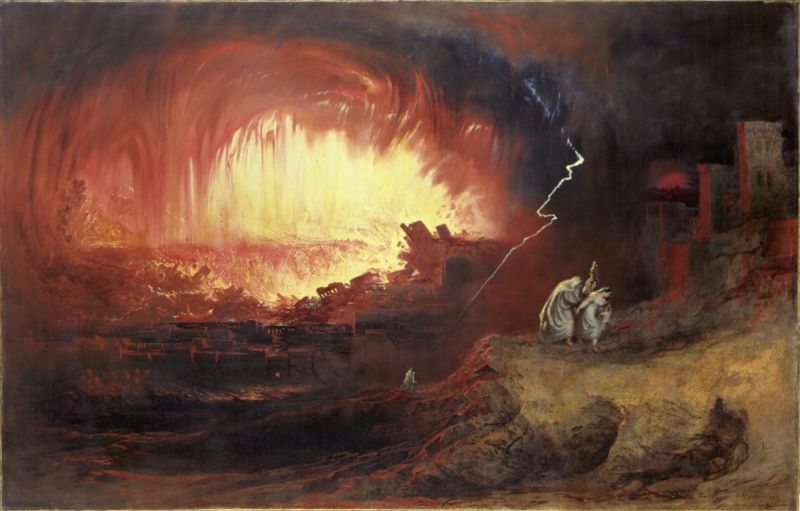 John Martin – Sodom and Gomorrah
John Martin – Sodom and Gomorrah
4. Verse (The Decline of the Western civilization)
In Scarlet Town the end is near (18)
The Seven Wonders of the World are here (19)
The evil and the good living side by side (20)
All human forms seem glorified (21)
Put your heart on a platter and see who’ll bite
See who’ll hold you and kiss you goodnight (22)
There’s walnut groves and maple wood
In Scarlet Town crying won’t do no good (23)
18) Now Bob Dylan gives it to us straight
19) They “have it all” in Scarlet Town
20) There seems to be no boundaries
21) Nakedness all over the place, I’m thinking of the fixation on body image and sex in the western media
22) Fornication/lovemaking all around
23) You’re fucked basically!
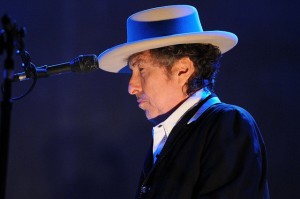
5. Verse (The Wars)
In Scarlet Town you fight your father’s foes (24)
Up on the hill a chilly wind blows (25)
You fight ’em on high and you fight ’em down in (26)
You fight ’em with whiskey, morphine, and gin
You’ve got legs that can drive men mad
A lot of things we didn’t do that I wish we had (27)
In Scarlet Town the sky is clear (28)
You’ll wish to God that you stayed right here (29)
24) Is he talking about fighting wars that were started by an earlier government? He might be…
25) Up on the hill = The Government
26) American soldier fighting all over the globe
27) A lot of regrets and as he says: Things we shouldn’t should have done.
28) In the home country there are no war planes or rockets in the air
29) The wish of a soldier to come home
6. Verse (There is hope)
Set ’em Joe, play “Walking The Floor” (30)
Play it for my flat-chested junkie whore
I’m staying up late, and I’m making amends (31)
While a smile from Heaven descends (32)
If love is a sin, then beauty is a crime
All things are beautiful in their time (33)
The black and the white, the yellow and the brown (34)
It’s all right there for you in Scarlet Town (35)
30) “Set ‘em Up, Joe” is an old country song by Vern Gosdin with the line, Set ’em Joe, play “Walking The Floor”, and it looks like Dylan says that the serious part is over now it’s time to be joyful
31) We work hard to get out of the crisis, things are looking brighter
32) God may not be in Scarlet Town, but there seems to be hope
33) He seems to say that he understand the preoccupation with beauty
34) All the different people of the world can have a meaningful co-existence…
35) …in America
I hope I haven’t offended anyone, and could just as easily had put Europe instead of USA. The Allegory would be just as poignant.
As I’ve said this is just a game, a play with verses and words, much in the same way (but not on his level of course) that Bob Dylan plays tricks with words. And there are lots of lines that I haven’t said anything about…
– Hallgeir


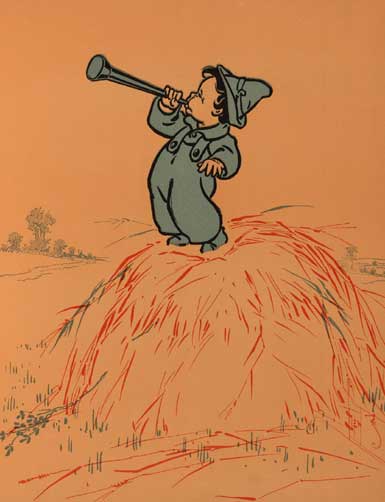
A super analysis. I tend to agree with all you say. Recognizing that “home town” is America is key.
It’s given me a lot to think about.
Thanks.
Thank you for the kind words!
– Hallgeir
Thanks for posting this as Scarlet Town is a favorite of mine on Tempest, with perhaps Duquesne Whistle and Tempest itself.
I thought of Scarlet Town as being the whole human City, the world… the allegory of public policy is interesting but perhaps a more inclusive allegory is ,or is also, intended?
The Temple Wall is nice… I took the marble to be the (floor of a) church and the stones to be that of the world outside as in Eliot’s AshWednesday .
this is to the side but is Christopher Ricks’ lecture on Scarlet Town available somewhere? online I find only tempest.
I should also like to read an analysis ,yours or his or anyone with a broad frame of reference, of After Midnight.
+Seraphim Joseph Sigrist
[email protected]
Thanks for your comments. Sorry I haven’t responded sooner, but I’ve been away on vacation.
I did consider that song as a description of the whole human race, and I think it’s as valid an interpretation as mine (western civilization).
About the Temple Wall and marble: Here I was reaching and knowing of Dylan’s love of poets, your take is very plausible.
Thanks again for the feedback 🙂
– Hallgeir
Hallgeir,
Nice job.
I have many thoughts on Scarlet Town (great song) some agreeing with your thoughts – others not… but I found it interesting that you also saw the Uncle Tom/Uncle Bill as Obama/Clinton.
I’m interested in your thoughts on “Soon After Midnight”. I think the narrator is stalking this woman. Others see it as a simple love song. Any thoughts?
Thanks for you comment, appreciated!
Soon after midnight is on the cards, but haven’t gotten round to it yet, I will definitely look into the stalking angle.
– Hallgeir
well, of course it could be a coincidence, but it’s the association between “Flat-chested whore” and “junkie” (5th line from the end) that made me think i’ve nailed it.
By the way, Scott Warmouth has a page on Pinterest on which people can upload their own findings about the sources of Tempest. You might be interested in checking it:
http://pinterest.com/scottwarmuth/a-tempest-commonplace/
Thanks again for the feedback, and thanks for the tip about the pinterest page, very interesting!
– Hallgeir
Yes, that could be it, but the term “Flat-chested whore” is not unusual in modern slang or pornographic descriptions. I also read in the Urban Dictionary that it was a synonym for tillymonster, that can mean a hypocrite.
But as we know, Dylan likes poetry, so the verse you show us here could very well be the reference.
Thanks for the feedback.
– Hallgeir
here’s the the source for the “flat chested whore” verses:
Dictating public taste
Becomes increasingly sacerdotal.
The responsibility for matching models
To piece goods changes daily.
Fashion is flat-chested,
A naked whore on stage at night,
Dealing by day in smooth chiffon
Beside the Zurichsee. We’re her pimps,
Stimulating demands for merchandise
To meet the needs of people dreaming
Of being led to bed by a bashful princess.
We’re her pushers, cutting prices
On assorted surplus lots we consider
Drugs on the market. We’re fabric junkies,
Hooked on noses, sold on clothing
As a universal nostrum for the naked spirit.
Dictating public taste
Becomes increasingly sacerdotal.
(Louis Daniel Brodsky -1974)
Hallo friends, can I bring here my support to understand better this wonderful song ?
Ok, verse 1
n.2 – the”ivy leaf” is the symbol of Canada, Bob was born in Duluth that’s near the border between USA and Canada; the “silver thorn” could be the iced stalactites
n.4 – It reminds me what he said in North Country Blues, even though those mines were not of gold
n.5 – I think it’s about slavery: in all the images we can see Uncle Tom as black and Uncle Bill as white (do you remember the image of Uncle Bill who says “We want you” ?..that one)
verse 2
“in the month of May” is also the month of his birthday
In this verse we can see a typical image of an american funeral, an open coffin were someone prays close the head of the dead
n.9 – Probably he remembers his childhood through it
verse 3
n.14 – here seems that he talks about cemeteries of different religions: “marble slabs” for christians, fields of stone for jews (they use stones instead of flowers)
n.15 – Everybody pray at the graves of their loved ones and “make wishes known”
verse 4
Agree with the interpretation about the decline of civilization, very strong when he says “Put your heart on a platter and see who’ll bite, See who’ll hold you and kiss you goodnight”, it’s a sort of invitation to stake ourself and open our eyes about the people around us, making a choice between who deserve our love and who not; “crying” is not a solution, he says
verse 5
The wars that here are supposed could be the wars that we fight every day.
n.24 – the “foes” are ancestral enemies, something that we inherit from our fathers
n.26 – the enemies are outside and (specially) inside of us and we fight them with drugs and alcohol
n.27 & 29 – the regrets are among those enemies
verse 6
Here is one of the most beautiful lyrics of all the album (“Tempest”): “If love is a sin, then beauty is a crime, All things are beautiful in their time”
n.35 – There is still a hope, but it depends on …YOU !
Thanks for your views on the song, quite different than mine on most accounts, but I think that is ok. I also think it’s just what Dylan wants. We use our own references to put meaning into his lyrics.
Thanks for great comments!
🙂
– Hallgeir
My favorite song of 2011 was Scarlet Town by Gillian Welch, and thus far in 2012 Dylan’s Scarlet Town may be my favorite. I love the sway of the rhythm and music in the new version.
Thanks for the feedback, I to love the hypnotic talking blues rhythm of Dylan’s Scarlet Town.
– Hallgeir
Zimmy’s a very hard guy to nail down but it IS fun to parse his lyrics as best we can. I like your interpretation but any consideration of the lyrics as somehow separate from the music or the great minimalist band doesn’t make much sense to me. You’re right, it’s a GREAT track. . .
That’s very interesting and it struck me after writing this post how little attention I had paid to the music. I just got so immeresed in the lyrics, and I aggree completely it should be viewed as a whole piece.
Thanks for the comment
– Hallgeir
not even close
I am 100% correct right in my analysis…and I expect that so will you be in yours
🙂
I’m just joking off course, I don’t pretend to have the thruth, just a simple opinion.
– Hallgeir
Very interesting and well thought out. Except for verse (27). You say that he has regrets about things he shouldn’t have done. Isn’t he saying just the opposite in the song? “A lot of things we didn’t do that I wish we had.”?
Your of course right about no 27, but the meaning (the meaning I put into it) doesn’t change, either way. I’ll do an update.
Thanks for the feedback, glad you thought it was interesting.
– Hallgeir
this is deep! thanks!
Thank you, it was fun to write and I hope it is fun to read!
– Hallgeir